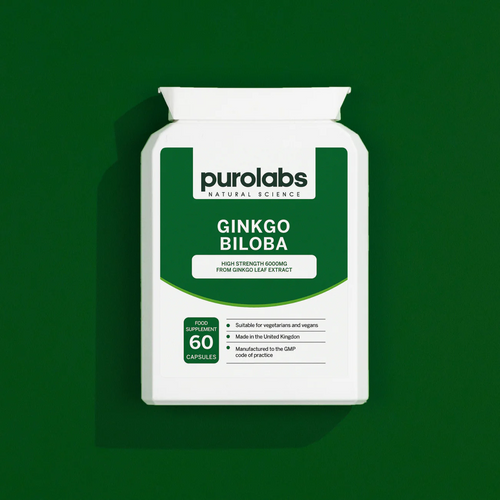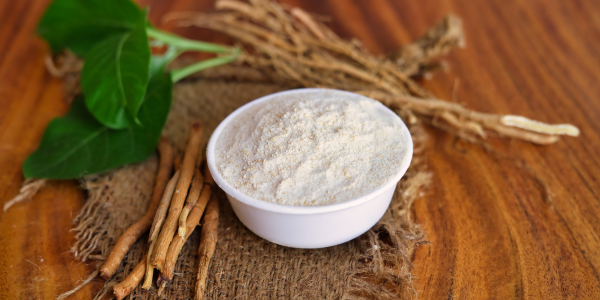Modern living has left the average person with much to deal with. Mounting deadlines, family and societal pressures, juggling roles on a daily basis, and doing this all whilst maintaining perfect mental and physical health feels seemingly unattainable.
People are therefore looking back at health practices and ingredients used to boost health and wellbeing long before alarm clocks were created.
Ayurveda, a system of traditional medicine with roots in India, has been established and used for human health for centuries and is making a resurgence in health practices today. Practices include yoga, acupuncture, massage therapy, dietary changes, and most notably herbal and adaptogenic medicine.
Adaptogens are plant compounds best known for their effects on stress, anxiety, and fatigue. These beneficial compounds have been used for thousands of years, with the oldest discovered adaptogens including1:
- Panax ginseng, known to improve male virility.
- Eleutherococcus senticosus (Siberian ginseng), studied for its effects on counteracting emotional, physical, and environmental stress.
- Cordyceps sinensis, the Chinese longevity and Viagra herb.
- Rhodiola crenulata, known for anxiety, fatigue, and depression along with immune and gut-supporting properties.
The need for adaptogenic compounds has never been greater, with chronic stress and mental health disorders on the rise, with no sign of slowing down2.
Whilst adaptogens have been used by humans since ancient times, the word ‘adaptogen’ was coined in 1947 by a Soviet scientist named Lazarev. He defined adaptogens as plant compounds that cause “non-specific resistance of the living organism” 3.
There are three general guidelines that plants must meet to be classified as adaptogens:
- When taken in normal doses, it is non-toxic.
- It helps the human body to cope with stress.
- It aids the body in finding its homeostasis (balance).
What do Adaptogens do to The Body?
Adaptogens are best known for their ability to enhance our bodies' resilience against physical and mental loads without increasing oxygen consumption, thus helping the body to take on less pressure and stress4.
More specifically, adaptogens work by decreasing sensitivity to stressors and improving the function of the neuroendocrine-immune system5.
Adaptogens, therefore, have an array of quite astonishing health benefits, including:
- Improving our immune systems response to stress and inflammation
- Neuroprotective, aka brain-preserving capabilities6
- Improving mental clarity and focus
- Potentially antidepressive properties
- Improving sleep, due to its calming effect on the central nervous system
- Beneficial effects on the HPA axis, which may improve hormonal balance and improve symptoms of menopause and PMS7.
- May potentially improve skin conditions, when applied topically8
- Help the body to physically cope with environmental stressors9
What’s the Best Way to Take Adaptogens?
Adaptogens can be ingested in various ways including capsules, teas, powders, and tinctures to be added to foods.
While administration should suit the individual's requirements, taking adaptogens in capsule form provides a standardized dose, which can be measured and tracked effectively.
Teas may enhance the enjoyment of ingestion; however, dosage and therefore the effects of the adaptogen in question may vary with each serving.
The evidence on when to take adaptogens varies. Some adaptogens are more stimulating and best taken in the morning or early afternoon, while other adaptogens promote calm and sleep and are best taken in the evening.
A good rule of thumb is to discover which adaptogenic herb is best for you, understand the health benefits of the herb, and let that dictate which time of the day is best to take it.
Purolabs Adaptogenic Supplements
After much research here at Purolabs, and understanding the growing need for supplementation to support the demands of modern living, we chose two of the most commonly used adaptogens which have been best sellers… and for good reason.
Ashwaghanda
Ashwagandha (Withania somnifera) use as an adaptogen dates back 3,000 years in traditional Indian medicine, with health benefits ranging from being used as a diuretic, stimulant, aphrodisiac, and stress reductor10
Other health benefits include:
- Mood boosting properties11
- Hormone balancing benefits.
- May improve athletic performance.
- Has been shown to potentially improve menopausal symptoms.
Our supplement contains the active compound, KSM-66, which means that the full plant has been extracted to maintain its full range of health benefits.
The administration of Ashwagandha is varied as it is an incredibly flexible plant compound.
The plant can be taken in the morning to focus on feeling calmer and reduce anxiety ahead of the day. It can also be taken in the evening to relax before bed and as a nervous system regulator, helping to promote a good night’s sleep.
While you can take Ashwagandha on an empty stomach, some studies suggest taking it with food to avoid any potential stomach upset.

Ashwagandha
Ginkgo Biloba
Ginkgo biloba is one of the oldest living tree species, with a single tree living as long as 1,000 years and growing up to a height of 120 feet. This natural medicine has a long history of aiding blood disorders and improving cognitive issues, most notably memory loss12.
Other health benefits of Ginkgo Biloba include:
- Improving blood circulation and heart health
- Boosting eye health
- Potentially helping to reduce the risk of dementia.
- Helping to reduce inflammation.
- Supporting the symptoms of depression and anxiety
It is best known today for its potent antioxidant effects, with our supplement containing Ginkgo’s dried leaf extract, packed with flavonoids and terpenoids.
Ginkgo biloba is best taken in the morning. Due to the adaptogen's health benefits as a cognitive booster, taking this plant compound in the morning will help improve focus and concentration for the day by promoting blood flow to the brain.
It can also be taken with or without food.

Ginkgo Biloba
Word of Caution
While adaptogens are safe and generally well tolerated by most, side effects can include:
- Nausea
- Abdominal pain
- Constipation
- Diarrhoea
Although adaptogens have been consumed by humans for thousands of years, the science to back the health claims touted long ago is relatively new. Therefore, certain populations and individuals should avoid adaptogen use, including:
- Pregnant and breastfeeding women
- Those with high or low blood pressure
- People with a history of stomach ulcers
- Those with autoimmune disorders, in particular those with thyroid issues
- Candidates for upcoming surgery
- Diabetics
If you are taking any medication that impacts brain/nervous system function, ensure that you seek the help of your GP or qualified health practitioner for contraindications.





















